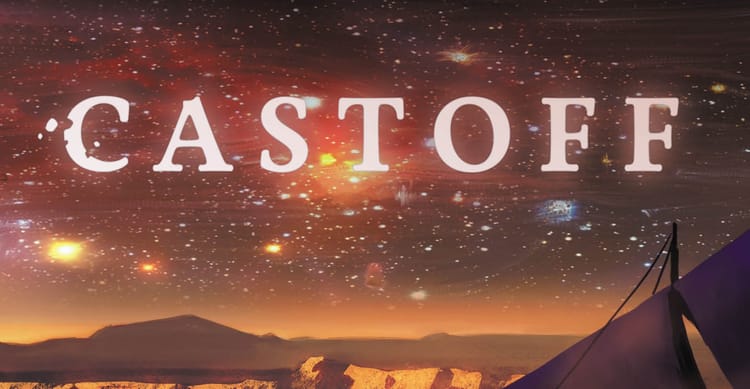Stone Soup Digest 11.25.22

Welcome to the Stone Soup Weekly Digest! This is where I share what I'm up to and some of my favorite things from around the internet. Subscribe to Stone Soup to get this in your inbox every week.
Content warning for frank discussion of queerphobia and mass violence in this section; scroll down for the link roundup, newsletter recommendation, archives, and HarperCollins strike support.
I am angry this week.
I have loved ones who express that queer people are fine as long as we’re not loud or obvious, as long as we aren’t too much. It’s hard for me to construct a response to that, because I believe – I truly believe – that they think they’re being generous and kind in those moments. I feel a deep longing to make them understand that this perspective is part of a legacy of violence against queer people, but I don’t know quite how to help them get there.
The first thing I think I want them to understand is that this framing insists on purely passive allyship. “It’s okay as long as I don’t have to know about it” is a succinct way to express “I will not stand up for your rights, because the moment you let me know that your rights are being violated, you’ve made me aware of who you are, which erases your humanity in my eyes.” It’s a preemptive act of looking away from pain and joy alike. I simply cannot believe that anyone who sees the world this way would help me, if they knew I needed help because of my queerness.
I also yearn for them to see how their perspective is rooted in an idea that queer people need to be approvable in order to be allowed. It leads to a notion that we should tuck ourselves and our joy away, that we should corral ourselves in order to be acceptable. But acceptability is a smokescreen. “It’s fine as long as I can’t see it” or “it’s fine as long as I can’t tell” are deceptive little phrases, because “it’s fine” is code for “I will allow you to be safe; I will not hurt you.” This is an expression that our queer minds, hearts, and bodies must be invisible, or else eliminated. When safety is conditional and dependent on unilateral interpersonal approval, it isn’t safety at all. Even when we meet those ill-defined conditions of acceptability, safety is far from guaranteed. Isolating queer spaces doesn’t prevent violence from intruding on them. Meeting the conditions of those who do not love us accomplishes nothing, because they want nothing for us and see nothing in us.
I have loved ones who express this notion that we are okay as long as we are hidden, and I still don’t know how to engage with those people. Not while knowing that I can’t extend unconditional trust in response to conditional respect. But I also have other loved ones, loved ones who I trust beyond any doubt, because I know they don’t see my humanity or the humanity of my community as conditional. I know that I can count on them to love, uplift, and celebrate my queer mind, my queer heart, my queer body. I have a beautiful community that comes together in moments of crisis, and I know that we are more than capable of carrying each other even when those who ought to help carry us refuse. We rejoice together, we celebrate together, we hurt together, we heal together.
We are never, ever too much. We are always just enough.
How You Can Support the victims of the Club Q shooting
Five people were killed and eighteen were injured in the Club Q shooting on Saturday. Here are some ways you can help.
Verified GoFundMes - these crowdfunding efforts are verified and will allow you to support victims and their families. Several people and families are directly losing income due to the closure of the club, and we can help them make ends meet by supporting their verified GoFundMes.
Colorado Gives 365 - this is the official Club Q donation site, which is state-run and organized to specifically help victims.
Colorado Healing Fund - this fund assists local communities with the financial, emotional, and physical needs resulting from mass tragedies that occur in Colorado.
Bystander intervention training – learn the vital skill of bystander intervention so you can de-escalate potentially violent situations as they occur.
First aid training – learn how to help people who have been injured so you can be a healing force in your community in moments of crisis.
Finally, although there isn’t a widespread directory immediately available, consider seeking self-defense training so you will be equipped to help protect yourself and your community:
- Here are some options in New York
- Here are some options in the San Francisco Bay Area
- Here is an option in the Los Angeles area
- Here’s a prefilled search to help you narrow down your options wherever you are. (I never thought I’d find a non passive-aggressive use for LMGTFY! How exciting!)
Some other stuff that’s been going on
Just Like Home is one of the best books 2022!
Well, according to the New York Public Library and NPR, anyway.
Preview: Know Your Station #1
My original comic series in collaboration with Liana Kangas comes out December 6th!! Check out the first five pages and the gorgeous cover art at this preview!
Social Media Round Up
Twitter continues to be a mess. Find me elsewhere:
I’m active on:
I have an account but don’t really post on:
TikTok
Mastodon
Hive (mobile only)
From the Archives: Thoughts on Tradition (again)
This is the time of year when Tradition rears its head the strongest. It sits at the dinner table and insists on being served. It is often a mere Habit, dressed in the uniform of Tradition, but we don’t call it that. We have always done the thing this way, and so we must always do it this way, uncritical and unquestioning: this is what we pass off as Tradition.
I have never been good at this last part. I have spent much of my life as a Holiday Problem, because I have never been comforted by Tradition. I suspect that this is a Queer Thing™. Traditions weren’t made to protect me, to serve me, to support me; they are for other people. The idea that we must continue existing the way we have been existing is an idea that supports those who are already pleased with the way things are. These kinds of people desperately need to believe that the things that have Always Been will Always Be, because that is the only thing that protects their comfort. The moment we start to ask questions, their comfort is at risk.
Visit a Neighbor: Helena Fitzgerald’s Griefbacon
Fitzgerald describes Griefbacon as “an essay-newsletter thing about weirdness and ugliness of the ways we try to love each other.” It is simply lovely.
The HarperCollins strike is still going strong and the union members remain enthusiastic and focused. I still won’t be dropping any book recommendations until an agreement has been reached, but you can check out these links to support the union members:
- HarperCollins Union Linktree
- Support the strike by making a donation to the strike fund
- Follow the HarperCollins Union Twitter
- A list of all HarperCollins imprints
If you’re a paying subscriber, come by the Stone Soup Supper Club for our weekly chat! I can’t wait to find out how you’re doing.
—Gailey






Member discussion